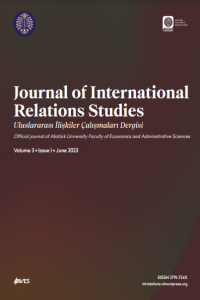Abstract
Bu çalışmada, araştırma sorusu olarak, Osmanlı Devleti’nin son dönemi ve Türkiye Cumhuriyeti’nin kuruluş yıllarında yaşanan Güç Dengesi sorunsalı Ulusal Stratejik Kültür kavramsallaştırması etrafında ele alınmış ve örüntüler argüman haline getirilmiştir. Makalede tarihsel süreç analizi yöntemi etrafında Türkiye’nin kuruluş döneminde takip edilen Güç Dengesi politikasının Osmanlı Devleti’nden miras kaldığı, fakat Osmanlı’dan farklı araçlarla politikaların yürütüldüğü detaylandırılmıştır. Türkiye’yi kuran elitlerin Osmanlı’nın mensubu olduğu ve bu dönem yaşananlardan ders çıkardığı ifade edilerek, Türkiye’nin ulusal stratejik kültürünün yeni Güç Dengesi anlayışı ele alınmıştır. İki savaş arası dönem itibarıyla Avrupa’da Güç Dengesinin Almanya lehine döndüğünü gören Türkiye Cumhuriyeti’nin kurucuları, bu durumu diplomatik yöntemlerle avantaja çevirmeye çalışmışlardır. Osmanlı’nın son döneminde de benzer bir Güç Dengesi oluşmuş, zira Avrupa’nın Osmanlı’yı parçalama planları ve Osmanlı’nın kendi iç sorunları söz konusu dengeyi aleyhine döndürmüştür. Bu durumda Osmanlı genellikle savaş yöntemine başvurarak bir şekilde Güç Dengesini lehine çevirmeye çalışmışsa da başarılı olamamıştır. Sonuç olarak, Osmanlı Devleti; Güç Dengesi politikasını savaş yoluyla operasyonalize etmiş ve toprak kayıpları ile imtiyaz verme gibi durumlarla karşı karşıya kalmıştır. Türkiye’nin yeni kurucu elitleri ise söz konusu manzaraya yakından tanık olmaları ve ders çıkarmalarının sonucu olarak, Güç Dengesi siyasetini diplomatik araçlarla yürütmeyi başarmış, neticede Hatay, Türkiye’ye iltihak etmiştir.
Abstract
In this study, the period of the Ottoman Empire and the founding of the Republic of Türkiye are discussed in relation to the concept of National Strategic Culture. The study highlights that although the Balance of Power policy was inherited from the Ottoman Empire in the founding period of Türkiye, it was carried out with different methods. The discussion notes that the elites who founded Türkiye were former members of the Ottoman Empire and that they learned valuable lessons from the decline period. The study explores the new Balance of Power understanding of Türkiye’s National Strategic Culture. By 1930, the founders of the Republic of Türkiye recognized that the Balance of Power in Europe had shifted in favor of Germany and sought to take advantage of the situation diplomatically. A similar Balance of Power was formed during the decline period of the Ottoman Empire when Europe’s plans to break up the empire and the Ottomans’ internal problems jeopardized the balance. The Ottomans attempted to shift the Balance of Power in their favor through war, but they ultimately failed. Consequently, the Ottoman Empire operationalized its Balance of Power policy through war and suffered negative outcomes such as territorial losses and concessions. In contrast, Türkiye’s new founding elites successfully carried out the Balance of Power policy through diplomatic means, having learned from the past and closely monitoring the situation. Ultimately, this approach led to the adhesion of Hatay.
Details
| Primary Language | Turkish |
|---|---|
| Subjects | Turkish Foreign Policy |
| Journal Section | Research Articles |
| Authors | |
| Publication Date | June 27, 2023 |
| Published in Issue | Year 2023 Volume: 3 Issue: 1 |
Content of this journal is licensed under a Creative Commons Attribution NonCommercial 4.0 International License


